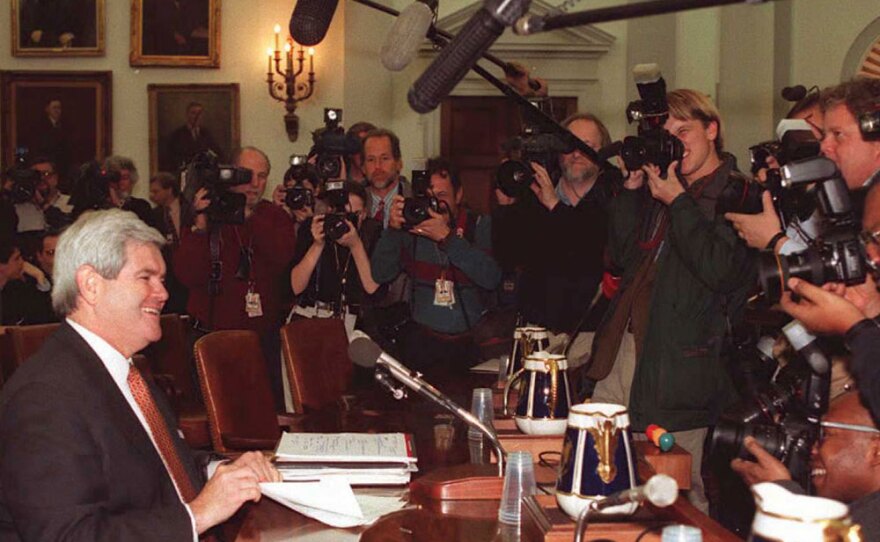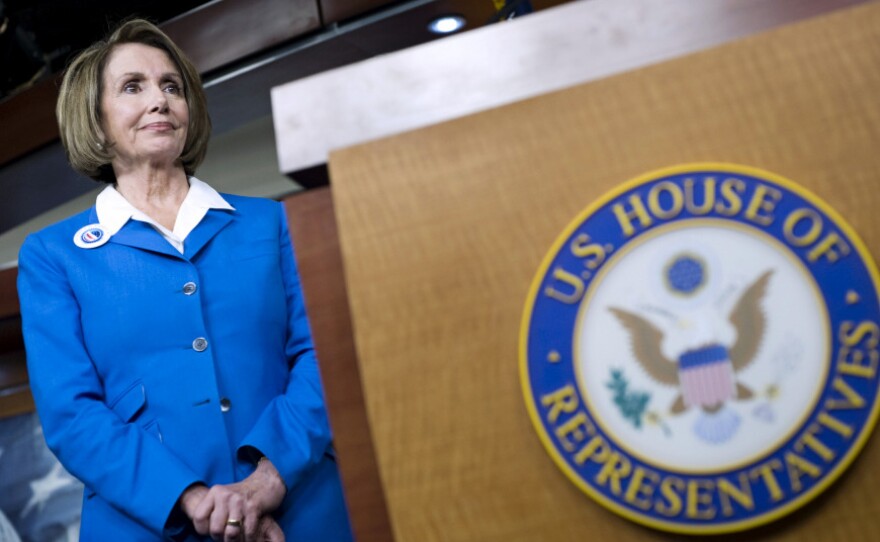Speaker Nancy Pelosi's supporters have hailed her plan to compete for House minority leader when Republicans take over the chamber in January, predicting that she'll "play rough" with the GOP.
An interesting notion. After all, even Pelosi's detractors characterize her as a no-quit fighter, interested in preserving Democratic initiatives, including health care legislation, that she pushed through as leader.
But history and House rules suggest the notion that Pelosi or any Democrat might be able to stymie Speaker-in-Waiting John Boehner and his Republican Party's agenda -- much less notch any legislative wins -- is far-fetched.

That's particularly true now, at what is effectively the start of the 2012 presidential election campaign. Republicans, focused on retaking the White House, have pledged to deny President Obama and his party any wins in the next two years.
So what are the House Democrats' options?
Well, they can certainly make a lot of noise and perhaps make some mischief in the minority, says former Democratic Rep. Martin Frost of Texas, who served in the House from 1979 to 2004.
One arrow in the Democrats' quiver is a parliamentary maneuver known as "motion to recommit." It allows the minority party to highlight unpopular or controversial elements of a bill and potentially send the legislation back to committee. If such a motion attracts enough support from majority party members it can delay or even kill a bill. At a minimum, such a motion can force the majority party to take a vote that puts its members on the record with an unpopular stand.
It has been used frequently by Minority Leader Boehner, most notably to push back on Democrats' energy and jobs initiatives.
Frost says that in the end, however, the House plays by casino-like "house rules," meaning that "the majority always wins."
That's the reality -- no matter how tenacious Pelosi proves, or how much Democrats try to stir the political pot.
House Rules
Unlike rules in the Senate, where members may engage in unlimited debate on legislation and one member of either party can stop a measure in its tracks, at least temporarily, House rules allow the majority party to stipulate how every bill proceeds.
That means the majority, through the House Rules Committee, controls whether or how many amendments can be offered on individual bills. The majority also determines how much time -- if any -- will be spent debating measures, and how that debate will proceed. That is, if any back and forth is allowed at all.
"That is the predicament of being the minority in the House -- the aggressive use of the Rules Committee to limit what the minority party can do," says Sarah Binder, an expert on Congress and legislative politics at George Washington University. "There's very little opening for the minority party to make a difference."
Take the word of former Minnesota Rep. Bill Frenzel, whose two decades in the House were spent in the Republican minority.
"As a purple-hearted veteran of the minority in the House, the Democrats simply don't have a lot of weaponry," says Frenzel, first elected in 1970. "In the same way they were able to overrun Republicans, Republicans can now overrun them."
"No matter how skilled [Pelosi] is, she lacks the horsepower to deliver from the minority party position," says Frenzel, 82, who is now at the Brookings Institution in Washington.
Just ask House Republicans, who in the past session were reduced to making lots of noise but wielding little, if any, influence as Pelosi and her large majority pushed through the health care overhaul.

Now it's Democrats, who have controlled the House since 2006, who will go from a position of incredible power to one in which they are at the mercy of the majority.
More Open Rules?
But what to make of Boehner's assertions that, as speaker, he would embrace a more open rules policy?
It's happened before, and not so terribly long ago. In the mid-1990s, partly in response to four decades of firm Democratic House control, Republican House Speaker Newt Gingrich initiated a "big drop in restrictive rules," Binder says.
Boehner, a Gingrich loyalist at the time, was part of the GOP's leadership team.
But by the late 1990s the rules restrictions had ratcheted up again as the GOP sought to more efficiently pursue its agenda.
The Rules Committee, established during the first Congress in 1789, hasn't always been used to concentrate power in the speaker's office, historians say. But it has become a tradition that has ebbed and flowed -- mostly flowed -- in the past 100 years.
In a chamber as diverse and unwieldy as the House, it seems leaders of both parties have taken away the lesson that it takes a dictator, in the form of the speaker, to get anything done.
"One of the most appealing parts about Speaker-presumptive Boehner is that he's talked about letting the committees work again, and having some openness to the rules," Frenzel says. "It's worthy of a try. I believe that was part of the secret of the old kinder, gentler Congresses."
But, Frenzel adds, Boehner will be under tremendous pressure "to do what Newt, [former Republican Majority Leader Tom] DeLay, and Nancy did: beat the heck out of the opposition and essentially choke them to death."
Here We Go Again
It only takes a quick look back to early 1995 to envision how debate, such as it will be, will unfold in the House come January.
From a C-SPAN video (at left) taken on Feb. 2, 1995, during the traditional one-minute morning speeches in the GOP-controlled House:
Boehner takes to the podium and espouses his party's "Contract with America" and efforts being made to pass a balanced-budget amendment, to ban "unfunded mandates," to pursue welfare reform, term limits and the line item veto. And, of course, tax cuts.
"Ladies and gentlemen," he says, "this is our contract with America."
Shortly after, then-Illinois Rep. Richard Durbin, now a Democratic leader in the Senate, was at the microphone (below).
Durbin: The Republican "contract on America" is a budgetbuster, with tax cuts for the wealthiest that will cost an estimated $900 billion over seven years.
"At a time we should put fat cats on a diet," he says, the GOP contract "puts them on the gravy train."
Frost advises House Democrats to attempt to force Republicans to vote on GOP initiatives, like Rep. Paul Ryan's economic proposal that includes major changes and cuts to Social Security and Medicare.
And he foresees "a lot of good guerrilla warfare" opportunity if Boehner loosens rules of debate and amendments.
Binder sees less opportunity for the minority party.
"The best Democrats can do is coordinate their message as best they can," Binder says, noting that even that may be a challenge, given the party's House leadership struggles now playing out.
"Can they hone a message? Can they help the party's reputation?" Binder says. "The challenge here is that Democrats may not be on the same page, and President Obama is under some pressure to move to the center.
"What becomes of House Democrats amidst all that?"
Copyright 2022 NPR. To see more, visit https://www.npr.org. 9(MDAzMjM2NDYzMDEyMzc1Njk5NjAxNzY3OQ001))






